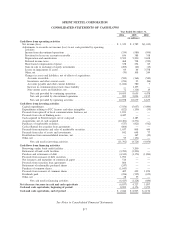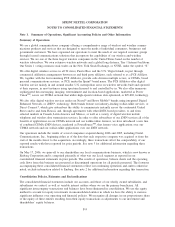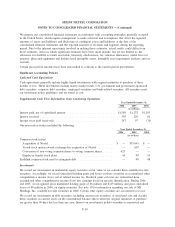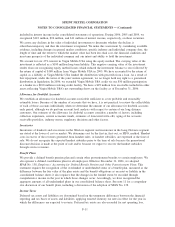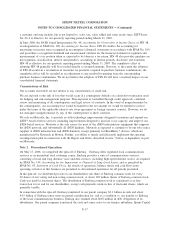Sprint - Nextel 2006 Annual Report Download - page 94
Download and view the complete annual report
Please find page 94 of the 2006 Sprint - Nextel annual report below. You can navigate through the pages in the report by either clicking on the pages listed below, or by using the keyword search tool below to find specific information within the annual report.a customer and may include, but is not limited to, sales, use, value added and some excise taxes. EITF Issue
No. 06-3 is effective for our quarterly reporting period ending March 31, 2007.
In June 2006, the FASB issued Interpretation No. 48, Accounting for Uncertainty in Income Taxes, or FIN 48,
an interpretation of SFAS No. 109, Accounting for Income Taxes. FIN 48 clarifies the accounting for
uncertainty in income taxes recognized in an enterprise’s financial statements in accordance with SFAS No. 109,
and prescribes a recognition threshold and measurement attribute for the financial statement recognition and
measurement of a tax position taken or expected to be taken in a tax return. FIN 48 also provides guidance on
derecognition, classification, interest and penalties, accounting in interim periods, disclosure and transition.
FIN 48 is effective for our quarterly reporting period ending March 31, 2007. The cumulative effect of
adopting FIN 48 generally will be recorded directly to retained earnings. However, to the extent the adoption
of FIN 48 results in a revaluation of uncertain tax positions acquired in purchase business combinations, the
cumulative effect will be recorded as an adjustment to any goodwill remaining from the corresponding
purchase business combination. We do not believe the adoption of FIN 48 will have a material impact on our
consolidated financial statements.
Concentrations of Risk
Our accounts receivable are not subject to any concentration of credit risk.
We are exposed to the risk of loss that would occur if a counterparty defaults on a derivative transaction used
for hedging and risk management purposes. This exposure is controlled through credit approvals, continual
review and monitoring of all counterparties and legal review of contracts. In the event of nonperformance by
the counterparties, our accounting loss would be limited to the net amount we would be entitled to receive
under the terms of the applicable interest rate swap agreement or foreign currency contract. However, we do
not anticipate nonperformance by any of the counterparties to these contracts.
We rely on Motorola, Inc. to provide us with technology improvements designed to maintain and expand our
iDEN»-based wireless services, including improvements designed to increase voice capacity and improve our
iDEN-based services. Motorola is the sole source for most of the iDEN infrastructure equipment that supports
the iDEN network, and substantially all iDEN handsets. Motorola is expected to continue to be our sole source
supplier of iDEN infrastructure and iDEN handsets, except primarily for BlackBerry»devices, which are
manufactured by Research in Motion. Further, our ability to timely and efficiently implement the spectrum
reconfiguration plan in connection with the Report and Order, described in note 7 below, is dependent, in part,
on Motorola.
Note 2. Discontinued Operations
On May 17, 2006, we completed the spin-off of Embarq. Embarq offers regulated local communications
services as an incumbent local exchange carrier. Embarq provides a suite of communications services,
consisting of local and long distance voice and data services, including high-speed Internet access. As required
by SFAS No. 144, Accounting for the Impairment or Disposal of Long-Lived Assets, and as permitted by
SFAS No. 95, Statement of Cash Flows, the results of operations, balance sheets and cash flows from
operating activities of this business are presented as discontinued operations for all periods presented.
In the spin-off, we distributed pro rata to our shareholders one share of Embarq common stock for every
20 shares of our voting and non-voting common stock, or about 149 million shares of Embarq common stock.
Cash was paid for fractional shares. The distribution of Embarq common stock is considered a tax free
transaction for us and for our shareholders, except cash payments made in lieu of fractional shares, which are
generally taxable.
In connection with the spin-off, Embarq transferred to our parent company $2.1 billion in cash and about
$4.5 billion of Embarq senior notes in partial consideration for, and as a condition to, our transfer to Embarq
of the local communications business. Embarq also retained about $665 million in debt obligations of its
subsidiaries. Our parent company transferred the cash and senior notes to our finance subsidiary, Sprint Capital
F-17
SPRINT NEXTEL CORPORATION
NOTES TO CONSOLIDATED FINANCIAL STATEMENTS — (Continued)


